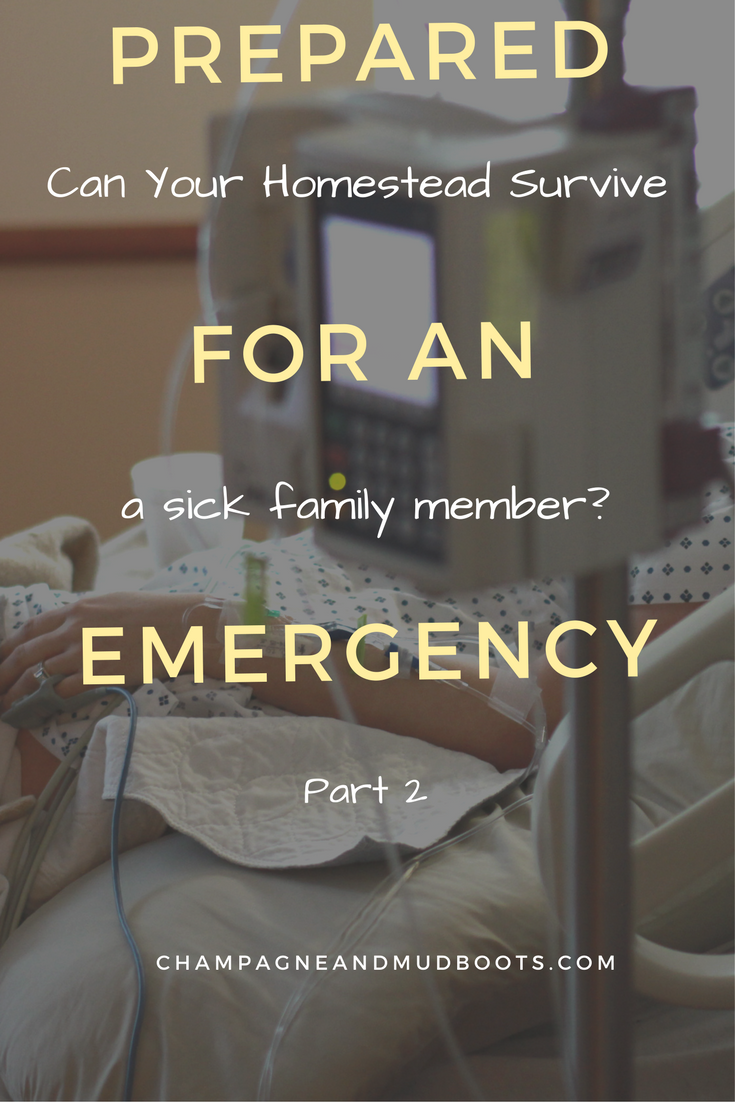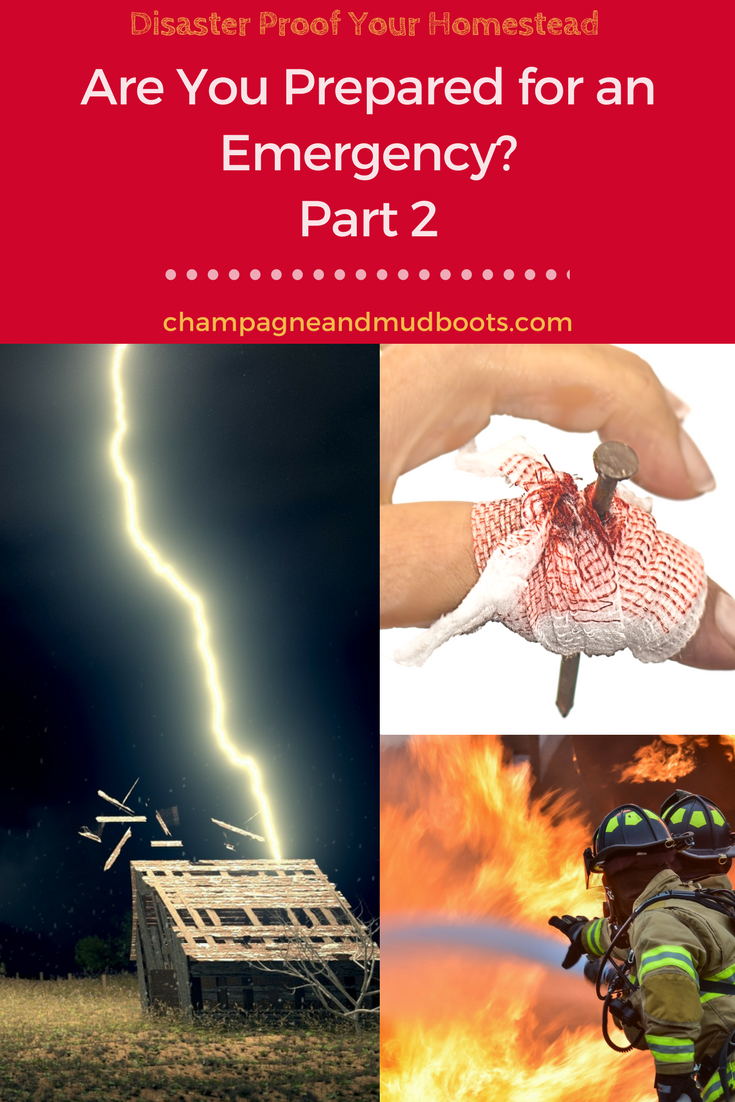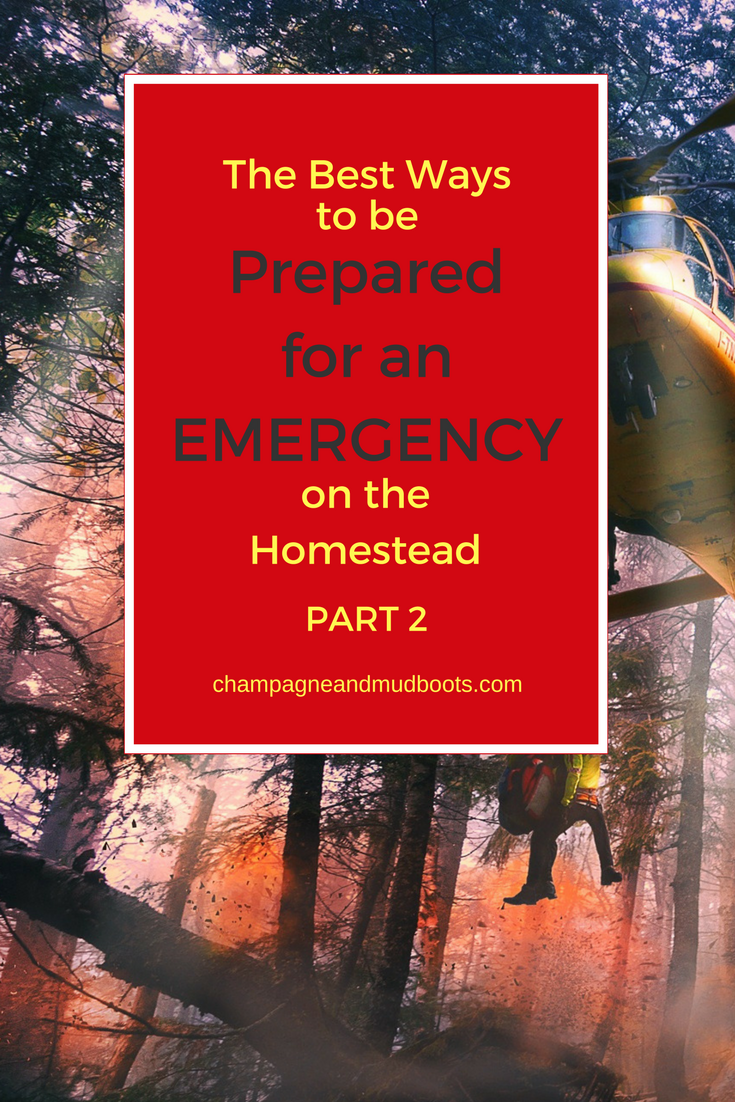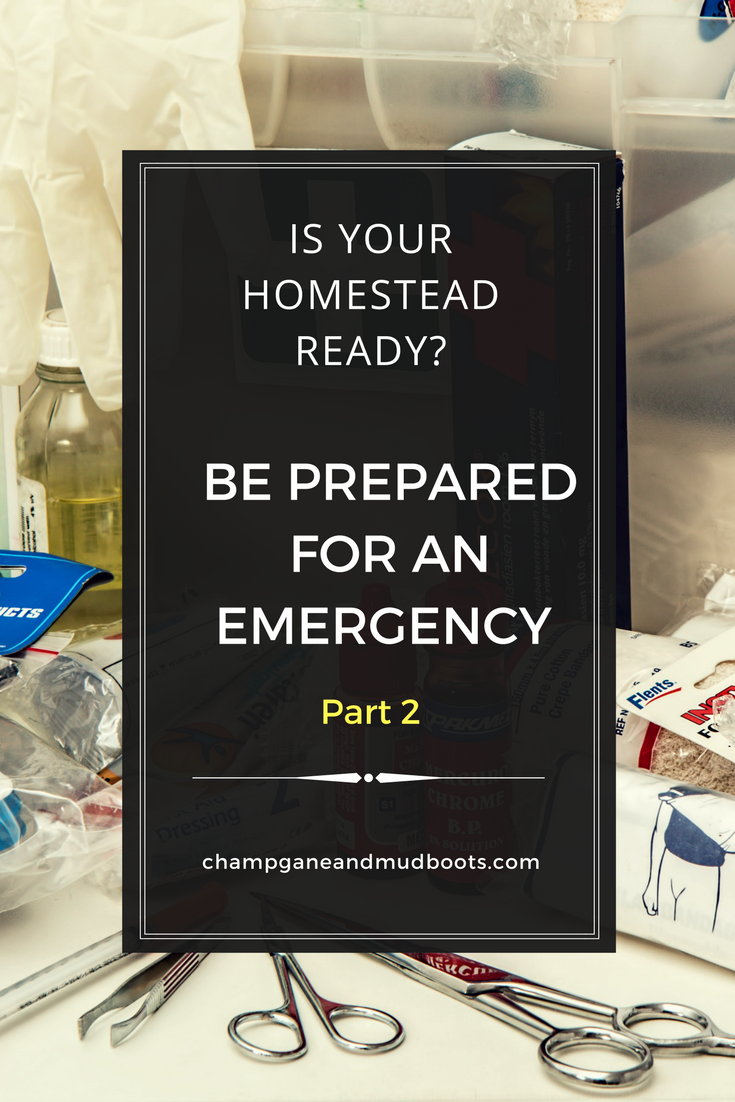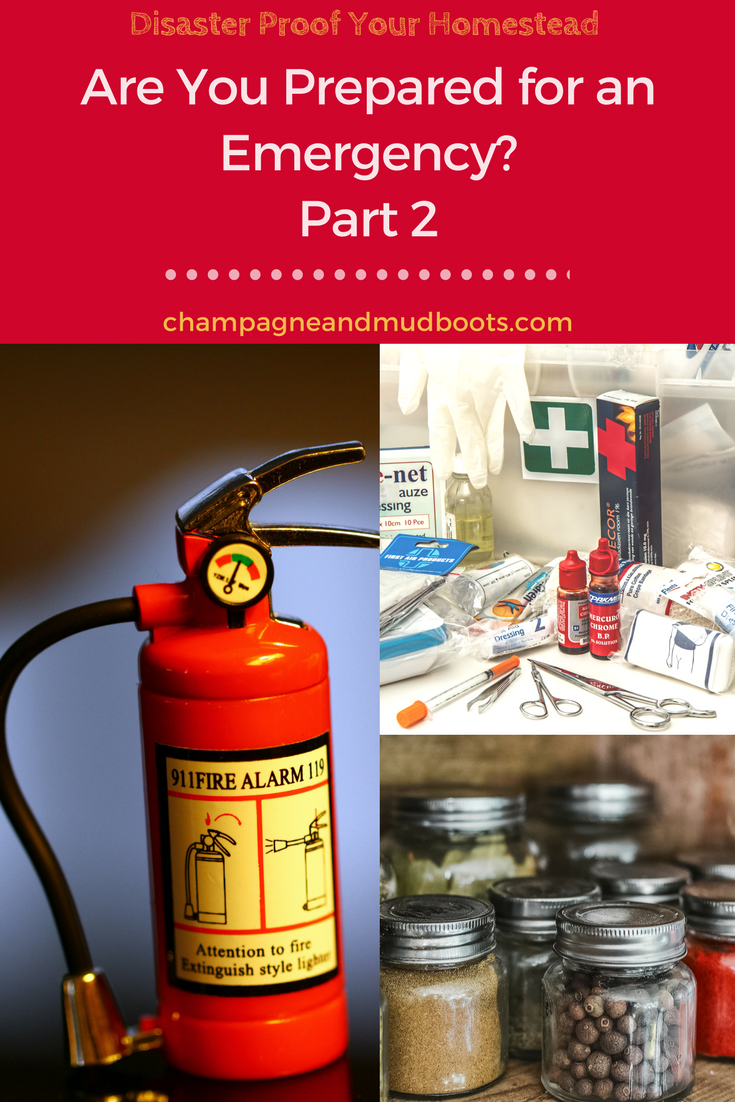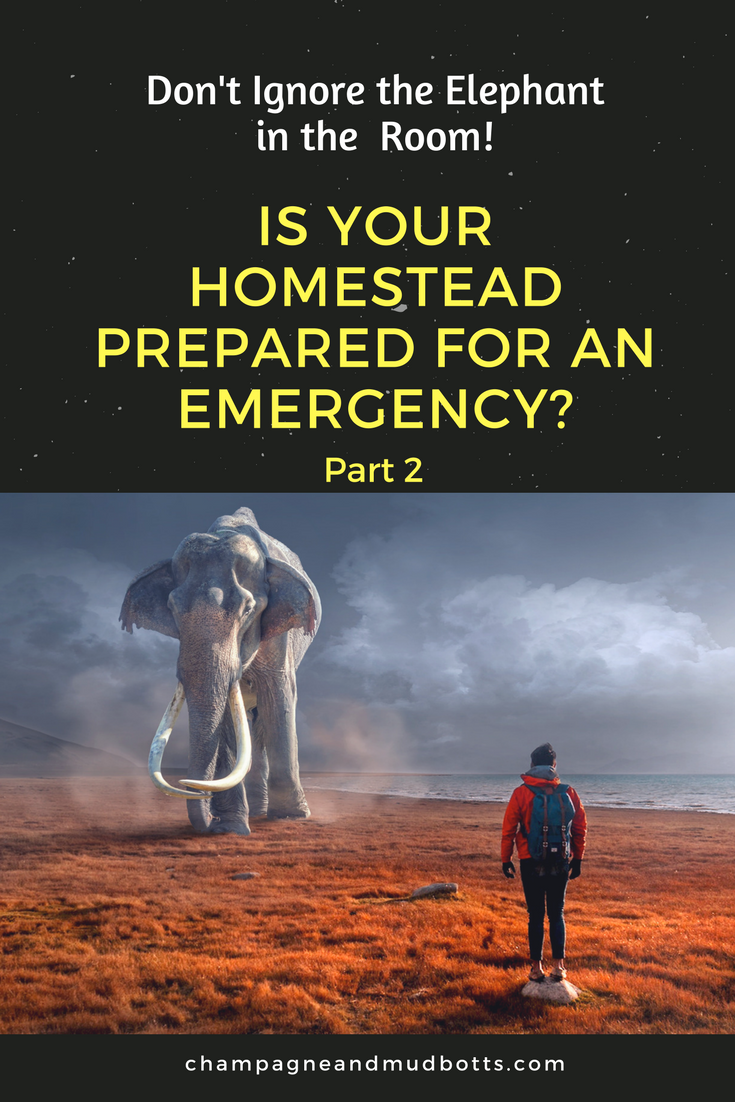The second installment in my ‘Is Your Homestead Prepared for an Emergency?’ series covers First Aid, Evacuations, and Family Member Health. If you have covered the bases for food and water I discussed in Part 1 then you can start to plan for these other emergencies.
First aid is good whether it’s an emergency situation or not because you never know when you’ll need to utilize these skills. Evacuations are sometimes planned like a hurricane and other times local disasters can prevent you from getting home. We will finish up with a super important topic that most of us don’t like to think about too often- the health of ourselves and family members.
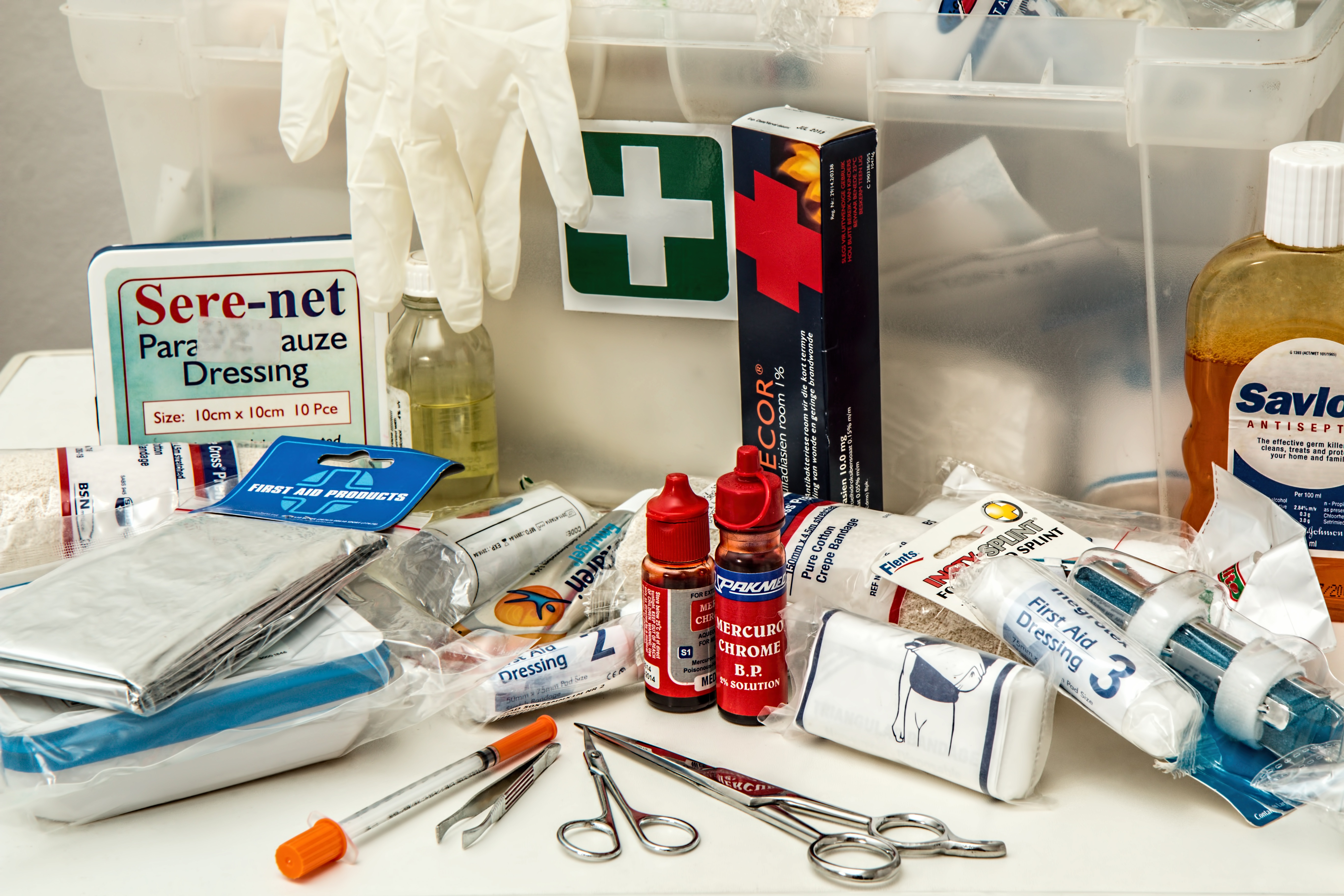
Prep 3: First Aid
Do you have supplies handy if there was a weather event or other disaster that delayed first responders getting to you? The usual suspects of gauze, tape, band aids, disinfectant or pain meds certainly apply but so do books and some basic training.
What if you couldn’t get on the Internet? An old-fashioned book can certainly give instructions on how to place a splint. If you or someone in your family doesn’t have a medical background, a first aid course may be very helpful to provide some groundwork on what to do if the need arose.
Make sure everyone knows where medical supplies are kept in your home and vehicle. Are they labeled and organized, yet out of reach of small children? The more organized you are with your supplies the faster you can treatment to those in need.
Are you or anyone in your family on chronic medications? Keeping an extra supply can save you if you get snowed in for a week and can’t get to the pharmacy. By the same token, are your animals, livestock, or pets on any kind of chronic medications for diabetes, seizures, etc? The same philosophy applies here, too.
It can be challenging to have an extra supply of critical meds on-hand, but will be well worth it if the need arises. Look for over-the-counter and generic options that may be available to you.
Back to livestock and pet first aid. Keep gauze and vet wrap for your animals along with cleaning supplies for cuts and wounds. Don’t forget syringes for flushing wounds. Take stock of any sterile syringes and injectables you may need as well.
Do you have pain meds that are species-specific? This is another area where having an actual first aid book comes in handy.
Always have appropriate muzzles on hand for cats and dogs. Your pet may be sweet as pie under normal circumstances, but if injured and hurting it is only reacting out of pain.
I know I’ve wanted to bite a doctor before when they injected me with lidocaine, so I don’t expect a pet to have more patience under duress. There are also feline muzzles available that cover the eyes and mouth that can help when handling an uncooperative pet.
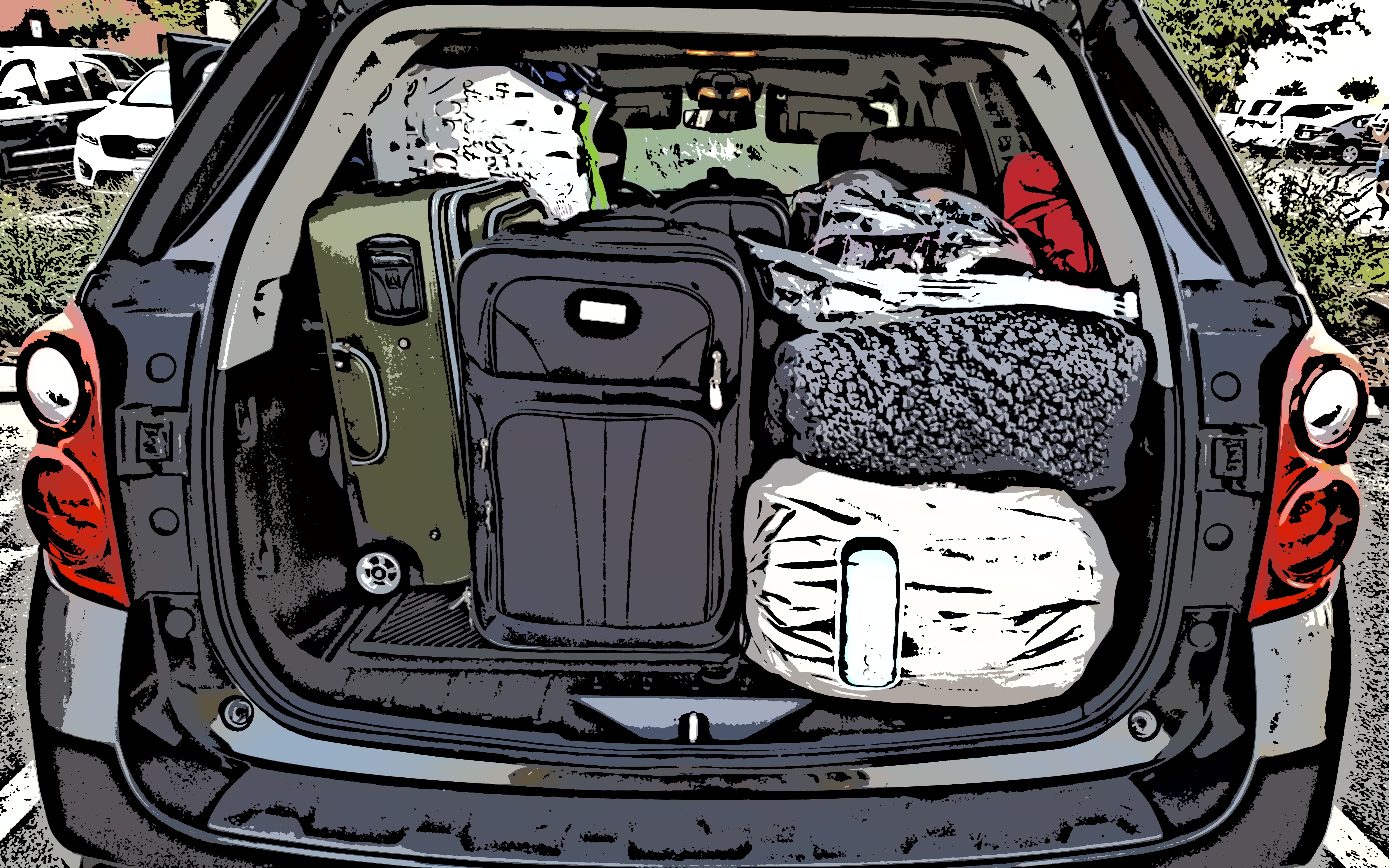
Prep 4: Quick! You Have to Evacuate!
What would you take with you? Do you need to take medications for you or your family? People talk about Bug Out Bags as if they are going to go off and live in the woods but this is soooooo not likely to happen. I, for one, am going to be pretty pissed if I ever have to be in such a situation!
You know what is likely to happen? Someone in the family is suddenly taken to the hospital and you have to follow. Or a train derails near you and you have to immediately evacuate your home for 3 days while they clean up the toxic mess. Ever tried packing for 3 kids for a family vacation? It’s kind of a beat down. Now imagine doing it in 30 minutes.
Life suddenly gets much easier or at least less crappy if you already have a bag packed that has clothes, snacks, and any needed items like a pair of glasses or contacts.
How would you move your livestock if you had to, or if you have to leave them behind, what could you leave for food and water? I saw an article during the California wildfires about a woman shoving her pony into an SUV. It worked, and desperate times call for desperate measures, but it helps to think through scenarios ahead of time.
All pets in the household should have carriers appropriate to their size. It is important to keep these in an easily accessible location where you can grab them and go rather than hunting around in the attic behind Christmas trees and old toys.
Did you know you can even train cats to go into a carrier willingly? Nothing says ‘good time’ like shoving an angry cat into a carrier, or a freaked out horse into a trailer! Training livestock and having a loading method for livestock will make the process much easier.
Anyone who has herded animals with a spouse knows what a marriage tester that is!!! Now image doing it while under duress and a time crunch! Keep this in mind the next time you load up to go to the vet, a show, etc. Rehearse it a couple extra times for everyone’s familiarity while you’re already at it.
Each person should know what the standard procedure is and what their specific job is to make it happen and make it as easy as possible on the animals. Practice lets everyone know their job and do it effectively.
In a scenario where it’s safe to be at your home but you have to be gone, such as for a sick family member, do you have someone you can call to take care of livestock for you even if for just a day or two until you return? If it’s too difficult to explain on the phone (especially under duress), or you may not even be able to do so, plan to write up a few pages on what to do as documentation.
Think about it- three pages maybe covering food, water, medicine, paddock shifting, times, seasonal needs, etc. Printed, laminated, nailed to the wall of your feed room. A permanent reference is now there for anyone to walk in and take care of business.
Arranging with neighbors or friends beforehand to be of mutual support for these types of scenarios is a great idea.
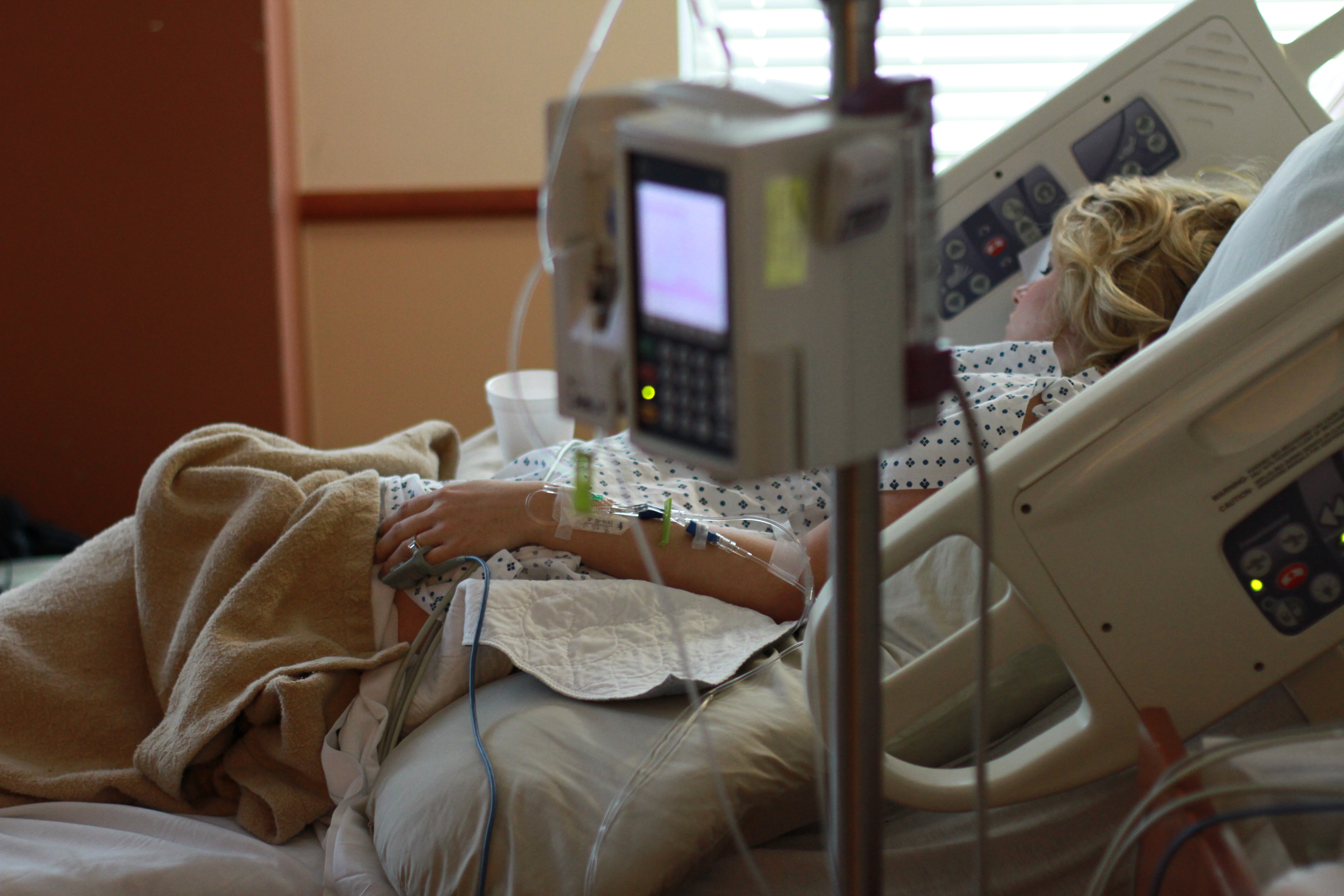
Prep 5: What if One Family Member is Sick? Or Worse, Dies?
This is probably one of the more terrifying scenarios. No one wants to think about mortality, but it’s a necessity to think through details and make a plan. Do you have a will? If you have kids, do you have a guardian appointed in writing if something were to happen to you? Do you carry life insurance to help with costs if you were no longer here?
It’s so easy to want to divide tasks up on the homestead, but actively cross-training each other and sharing knowledge and how-tos in case one or the other is no longer around – or incapacitated – is crucial.
Do both of you know how to access any and all accounts for both personal and for any businesses pertaining to the homestead? Passwords and necessary accounts need to be in some type of master list in a secure location that applicable parties can get to. It’s a little mindboggling to think of how many passwords my husband and I have between just the two of us!
For security reasons, are you also occasionally changing passwords? I absolutely hate this one, as it’s hard enough to keep them all straight, but it is a better cybersecurity practice. And since my husband is an IT engineer, he frequently (and annoyingly…oops did I just type that outloud?!?) reminds me of this one…
Does everyone on the homestead understand and practice all livestock chores, and how to do them? Do you have that printed list with instructions that would make it possible for a farm babysitter to come in if needed and help you?
It just takes one surgical complication to take you from just one week laid up, to suddenly needing advanced care and a 3-4 month recovery. Could your homestead make it if this happened? Do you have multiple income streams or disability insurance that can fill in financial gaps?
Family illness and death considerations are probably the most important after food and water since it contains some of the most common disasters that can befall any of us. I can say without a doubt though, that getting our wills written was the biggest sigh of relief, especially since we have kids.
Once they were notarized, it was something I could just take off the list and not have to think about. And if you are anything like me, checking something big off the ‘to stress about list’ sounds awesome.
And here’s a modern plot twist. Do you own any cryptocurrency assets such as Bitcoin? If so, do you know how to access these funds if something happened to either of you?
Many of these currencies require multiple levels of sign-in authentication on specific devices (that are probably locked) to access the accounts, so going over where and how to control this is very important. Understand that if these accounts cannot be accessed, recovery is difficult by design and may be impossible. With fluctuations in the market it is difficult to say how important it will be but it could be a big deal if you hold these.
Stay tuned for Part 3 in this series when I discuss power sources, weather events, and practice drills. You can also check out Part 1 for a review on food and water preparedness.
